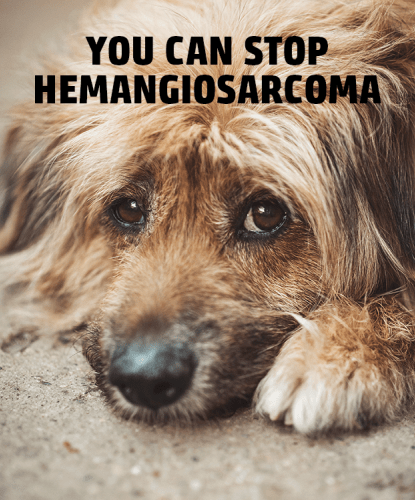
Updated April 17, 2024 – In 2012, Morris Animal Foundation launched its Golden Retriever Lifetime Study, designed to identify the risk factors for cancer and other major diseases in dogs. The Study’s primary endpoint is 500 cumulative diagnoses of four cancers – hemangiosarcoma, lymphoma, high-grade mast cell tumor and osteosarcoma.
Now, 10 years into the Study and nearing the Study’s defined endpoint, data gathered from Study dogs shows a clear prevalence of hemangiosarcoma as the leading cause of cancer death. Of all dog deaths to date, 75% are cancer-related; of those cancer deaths, almost 70% are hemangiosarcoma.
These findings have led the Foundation to announce a major Hemangiosarcoma Initiative to dedicate funding, people and resources to advance the prevention, detection and treatment of, and potentially cures for, this devastating cancer. The new initiative is a multiyear, multimillion-dollar endeavor to dramatically change the story of hemangiosarcoma from one with an ending of almost certain death to one with a new beginning.
The Foundation will be supporting studies through the Hemangiosarcoma Initiative that have high potential for translation to clinical practice, in the areas of:
- Early disease diagnosis
- New therapeutic approaches, either alone or paired with diagnostics to monitor treatment efficacy
- Genomic prediction of breeding values
Access to samples and data from the Golden Retriever Lifetime Study is available to researchers and research groups applying to this initiative, although other samples and datasets may also be used. The Hemangiosarcoma Initiative Request for Proposals is open January 12 through April 5, 2023.
For more information or to begin a grant application for the Morris Animal Foundation Hemangiosarcoma Initiative, visit Morris Animal Foundation Apply for a Grant.
Hemangiosarcoma Overview
Hemangiosarcoma is one of the deadliest forms of canine cancer. Hemangiosarcomas frequently are located in areas of abundant blood supply such as the heart and spleen. This predilection for growth in blood-rich areas is the reason these tumors are so deadly. Hemangiosarcomas can suddenly rupture, causing massive blood loss, and forcing owners and veterinarians to make difficult decisions within minutes of diagnosis.
Hemangiosarcoma most commonly affects:
- Middle-aged to older dogs
- German shepherds, golden retrievers, Portuguese water dogs and Labrador retrievers
- Slightly more males than females (in some studies)
Unfortunately, no clinical signs (symptoms) are classic for hemangiosarcoma other than sudden, profound, internal bleeding. Other clinical signs sometimes reported by owners include:
- Intermittent lethargy or fatigue
- Anorexia
- Panting
- Sudden collapse
- Sudden death
Even when a tumor is quickly detected and removed, the outlook for dogs with hemangiosarcoma is grim. Statistics show that:
- Average survival time with surgery alone is one to three months
- Average survival time with surgery and chemotherapy is five to seven months
- 90% of dogs are deceased one-year post-diagnosis despite surgery and chemotherapy, with almost 100% mortality two years post-diagnosis
Survival times have remained static for nearly 30 years, and veterinary oncologists feel a change in approach is needed to unravel the current knowledge gaps in hemangiosarcoma biology in order to improve our current ability to diagnose and treat this disease.
Many current and past studies have been devoted to learning more about this terrible cancer. New findings reported in the last two years include:
- A recent study focused on small dogs with hemangiosarcoma found similar survival statistics as large-breed dogs with hemangiosarcoma
- Work continues on the effect of spay/neuter on the incidence of hemangiosarcoma, but no definitive conclusion has been reached yet
- Researchers from North Carolina State University found a higher incidence of the bacteria Bartonella spp. in some dogs with hemangiosarcoma and are doing more studies to clarify their findings
Summary of Morris Animal Foundation’s Investment in Hemangiosarcoma Research
The Foundation has invested nearly $7.5M (not including the Golden Retriever Lifetime Study) in 79 studies either directly focused on hemangiosarcoma or studies that included hemangiosarcoma in the study population (including some early work looking at cancer as a whole in dogs).
The Foundation has funded 14 studies focused solely on hemangiosarcoma since 1999, with a total investment of $2.1M (these figures exclude training grants). *See Addendum - Hemangiosarcoma grants (current/past) funded at Morris Animal Foundation.
An important addition to this body of work will be the results obtained from the Golden Retriever Lifetime Study. Hemangiosarcoma is an important cancer of golden retrievers and one of several cancers of special interest to the Study.
In addition to samples collected at the time of diagnosis or death, banked samples on affected dogs dating back years may point to risk factors associated with this cancer. This rich data repository provides a unique opportunity for collaboration and research.
The Golden Oldies project will provide additional, critically needed data on the underlying genetics of hemangiosarcoma with genomic sequencing of golden retrievers over the age of 12 who have not developed cancer.
Topics of Research Interest – Expert Opinion
Hemangiosarcoma is a popular study topic for many veterinary oncologists and pathologists and well as other scientists.
A series of interviews with subject matter experts was conducted to understand the big questions that remain around hemangiosarcoma, as well as get a feel for the type of research in progress on the disease. Several major themes emerged from the interviews, including:
- Knowledge gaps in the basic biology of the disease
- Knowledge gaps in understanding metastasis
- Need for early diagnostic tools
- Better ways to monitor response to therapy
- Understanding genetics/genetic markers of disease in specific dog breeds
Other comments from the interviewees include:
- The need for better education of veterinarians on hemangiosarcoma and a paradigm shift in thinking away from “it’s a death sentence.” Because many dogs are euthanized at the time of diagnosis (due to poor prognosis, finances, emergent situation requiring quick decisions) some researchers felt it’s hard to estimate how many dogs could survive longer than current estimates.
- Subtypes of hemangiosarcoma might have different long-term prognoses but major knowledge gaps exist in identifying and following dogs with different hemangiosarcoma subtypes.
- New information suggests hemangiosarcoma actually arises in the bone marrow and spreads to well-vascularized organs (such as the spleen, liver, right atrium). Once a mass is located, even if it is a single mass, it is a metastatic lesion, not a primary tumor.
- Clear breed predispositions exist for risk of hemangiosarcoma, but many researchers believe it would be difficult to breed hemangiosarcoma out of a particular breed.
- Some respondents felt strongly about early diagnosis if different cancer subtypes were identified and prognoses differed – this could help owners decide if they wanted to proceed with treatment.
- Several respondents discussed what an early diagnostic test would mean to owners and veterinarians – would owners receive genetic counseling? How would a high-risk dog be monitored?
- Almost all interviewees discussed ongoing gaps in understanding basic tumor biology and how greater understanding could be the key to better treatment.
- Two subjects discussed finding a way to monitor response to treatment via blood testing/identification of biomarkers. Current methods tend to be crude and insensitive.
Industry Overview
Several respondents pointed to other organizations and private companies engaged in work specifically on hemangiosarcoma. Some of the details of this work are not publicly available but those mentioned by the interview subjects include:
- PetDX – OncoK9 test (liquid biopsy test)- this team recently published their findings in the journal PLOS ONE.
- Ethos Discovery – this group launched a collaborative program in August 2019 known as ePUSH. Several interview subjects mentioned this study as particularly good.
- FidoCure® - this company uses genomic data to identify possible cancer-causing mutations and then suggests targeted therapy to precisely attack the cancer cells. This group also recently published a study of their tumor sequencing results.
- Shine On Study – This study is a joint collaboration of the American Boxer Charitable Foundation, the Golden Retriever Foundation, the Portuguese Water Dog Foundation and the AKC Canine Health Foundation. The study uses artificial intelligence and a new test (the Shine On Suspicion Test) to detect dogs at risk for developing hemangiosarcoma. High-risk dogs are then eligible to receive the drug eBAT for prevention. The project is following the dogs for their lifetime as a first step toward a larger study and, ultimately, if the approach is effective, for use in the veterinary community at large.
- AKC-CHF is funding numerous other studies on hemangiosarcoma.
- In addition, results from the Vaccination Against Canine Cancer Study (VACCS trial), currently in progress, could have implications for future treatment of hemangiosarcoma in dogs. The vaccine, developed at Arizona State University, is an attempt to produce a universal vaccine against cancer. The team ultimately wishes to use the vaccine in people but is testing it first in dogs.
For more information or to begin a grant application for the Morris Animal Foundation Hemangiosarcoma Initiative, visit Morris Animal Foundation Apply for a Grant.
Addendum - Hemangiosarcoma grants (current/past) funded at Morris Animal Foundation
| Project Title | Name | Organization | Grant Amount |
| D22CA-609: Discovering potential CAR-T cell targets in canine hemangiosarcoma | Corrine Thomas | University of Illinois | $5,000.00 |
| D21CA-614: Role of canine hemangiosarcoma-associated extracellular vesicles in promoting tumor angiogenesis | Samantha Scott | Tufts University | $5,000.00 |
| D18CA-409: Targeting α1--Adrenergic Signaling to Inhibit Hemangiosarcoma Tumorigenesis | Derek Korpela | University of Minnesota | $91,081.30 |
| D18CA-017: Targeting Alpha-AR Signaling to Inhibit Cholesterol Processing and Arrest Hemangiosarcoma Growth | Erin Dickerson | University of Minnesota | $169,491.97 |
| D17CA-059: Targeting β-AR Signaling to Arrest Hemangiosarcoma Progression and Overcome Chemoresistance | Erin Dickerson | University of Minnesota | $169,806.98 |
| D16CA-601: Determination of Differential Protein Expression in Primary and Metastatic Hemangiosarcoma Tumors in Dogs - An Observational Pilot Study | Stephanie Harris | Midwestern University | $5,000.00 |
| D14CA-047: Lysosomal drug sequestration by CSF-1R(high) tumor cells contributes to drug resistance in canine hemangiosarcoma | Erin Dickerson | University of Minnesota | $134,943.22 |
| D13CA-400: Slug and Interleukin-8 in Self-Renewal of Cancer Stem Cells in Canine Hemangiosarcoma | Jong Hyuk Kim | University of Minnesota | $100,000.00 |
| D13CA-062: Role of CSF-1R in the maintenance of hemangiosarcoma cancer stem cells | Erin Dickerson | University of Minnesota | $117,255.08 |
| D10CA-501: Discovery and Characterization of Heritable and Somatic Cancer Mutations in Golden Retrievers | Jaime Modiano | University of Minnesota | $1,008,807.00 |
| Tyrosine Kinases in Canine Hemangiosarcoma | Stuart Helfand | Oregon State University | $203,227.59 |
| Development of a Genomic Assay to Profile Archival Canine Hemangiosarcomas | Stephanie Montgomery | North Carolina State University | $2,000.00 |
| Receptor Tyrosine Kinase Activity in Canine Hemangiosarcoma | Stuart Helfand | Oregon State University | $162,000.00 |
| Characterization of Von Willebrand Factor in Dogs with Hemangiosarcoma: A Pilot Study | Andrew Mackin | Mississippi State University | $4,200.00 |
| TOTAL | $2,177,813.14 |





